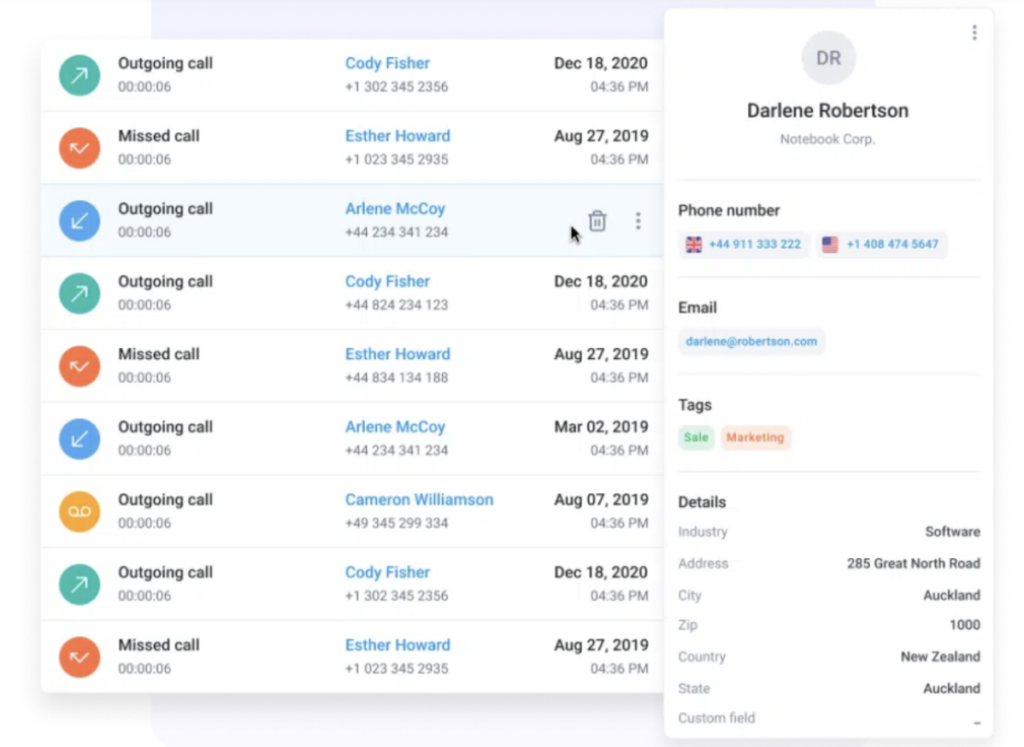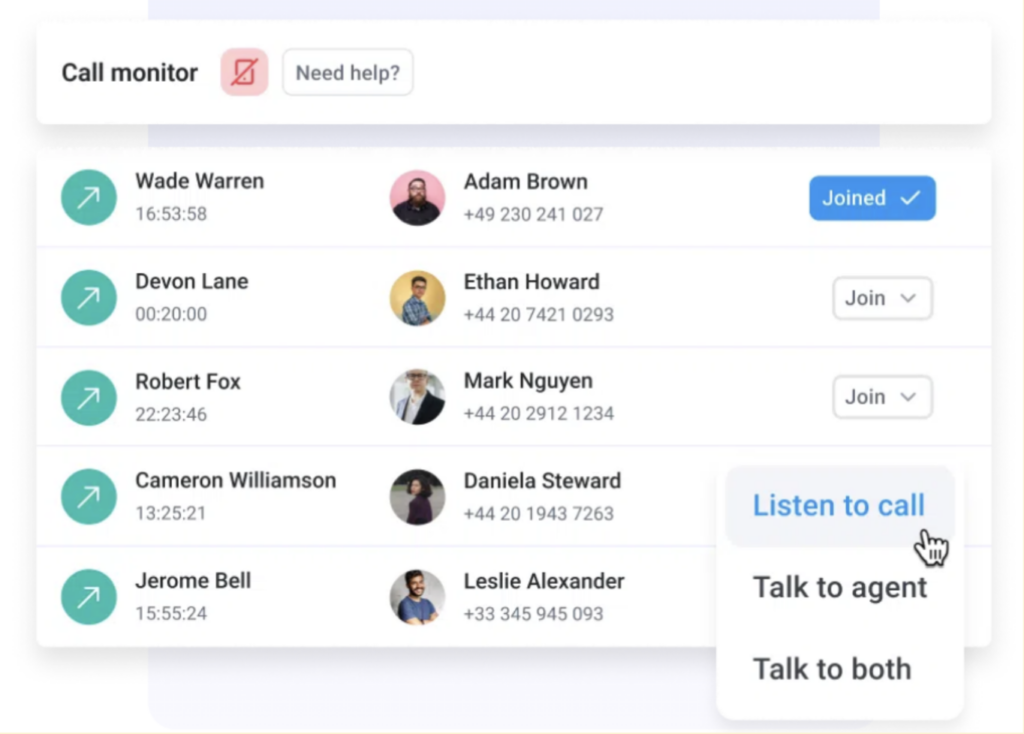Working in a Call Center: What You Need to Know Before Starting

Did you know that the global call center market will be worth $29.44 billion by the end of 2024, and is set to grow to $47.57 billion by 2030?* That’s a lot of customer service roles just waiting for the perfect agent. Could you be one of them?
If you’re thinking about a role in a call center (or getting ready to start), it makes sense to learn more about the industry. You can then hit the ground running and transform your new position from “just another job” to the start of a long-term, fulfilling career.
But where to start? It can be a challenge to get your head around an entire industry, especially if you’re just beginning your journey.
That’s why we’ve done the hard work for you. We’ve summarized the types of call centers, the typical responsibilities of each role, and the skills you need to thrive. Plus, we’ve outlined the pros and cons of call center work and gathered top tips on how to succeed.
Key takeaways:
- Working in a call center can be fulfilling and flexible, offering transferable skills, competitive pay, and job security, including remote options. However, it can also involve unpredictable hours and high-pressure challenges.
- Success in a call center role requires excellent communication, empathy, organization, and technical skills.
- Familiarity with modern call center tools and features like those included with CloudTalk can help you impress managers from the start.
Maximize your chance of call center success with CloudTalk
*Global Call Centres Market by Component, Deployment, Vertical – Forecast 2024-2030 report
Call Centers: Types and Responsibilities
A call center is traditionally a location from which customer service or sales staff answer phones to help customers solve their problems with a product or service. This might include everything from technical difficulties to billing issues.
But modern call centers are much more than that. There are now five main types.
Types of Call Centers
Many call centers will now be a mixture of some or all of the following:
- Inbound: Receives calls from customers, and manages customer queries. Calls are usually from existing customers calling with technical questions, orders, feedback, and billing issues.
- Outbound: A marketing or selling agency that calls (or otherwise communicates) with customers to sell to new prospects, upsell existing clients, gain feedback, or do research.
- Virtual: A virtual call center (VCC) refers to customer service software, where the “center” is in the cloud, and coworkers and callers are connected online, from anywhere.
- Automated: This is where no human agents are involved, and routine customer queries are answered by an automated voice, chatbot, or intelligent help page.
- Omni-channel: A customer service set-up that enables voice and text communication with customers via many channels, including phone call, chat, SMS, and social media.
Call Center Responsibilities
Your typical responsibilities when working in a call center will usually include one or some of the following:
- Handling customer inquiries: Helping customers or clients with questions or issues. These can vary from simple issues resolved with a quick call, text, or canned response, to complex problems requiring an expert agent.
- Providing support and resolving issues: Most of the time, customers will only contact a representative if they have a problem. A good call center agent will understand this, and give callers a good customer experience by talking them through solutions professionally.
- Meeting performance metrics (e.g., call handling time, customer satisfaction): Call center staff will typically be expected to hit certain KPIs or metrics, including resolving an ideal number of issues, handling calls within a certain timeframe, or making a set number of sales.
Call Center Job Descriptions
Working in a call center goes way beyond simply answering a phone or headset. In fact, being successful in a customer support role requires serious organization, team building, and quality control.
While we’re specifically covering direct-contact agent work in this article, here are some of the main roles you may find in a typical call center:
Call Center Job Descriptions
Typical level
Role
Duties
Managerial
Call Center Manager
Hiring, training, and motivating staff members to do their best work. Setting goals, helping staff hit targets, analyzing and tweaking targets.
Managerial
Team Leader
Often the link between staff and managers. Call center monitoring, training, supporting staff, managing and reporting performance.
Senior
Quality Assurance
Responsible for ensuring the product meets company quality standards. Detail-oriented from design to implementation, and problem-solving.
Senior
Technical Support Agent
Someone with detailed know-how on the product. Translating technical knowledge into simple and useful advice to solve customer issues quickly.
Starter to Senior
Customer Service Representative
Combines product and service knowledge with representing the company well. Solving customer questions and issues professionally.
Starter (typically)
Outbound Call Center Agent/Telemarketing
A type of sales role. Reaching out to potential customers to generate interest and/or sell to new prospects persuasively and helpfully.
What Skills Do You Need To Work in a Call Center?
Working in a call center helps you develop crucial skills and transferable experience that are beneficial throughout your career.
1. Communication
Good communication in a call center involves effectively sharing information and ensuring clear interactions between agents, customers, and team members. It requires active listening, a good Talk/Listen Ratio, and professional responses to address customer needs.
Effective communication goes far; one Salesforce study found that 88% of customers are likely to re-purchase and 75% are even willing to overlook company mistakes if they receive excellent customer service.
2. Flexibility
By this we mean emotional flexibility, or responding appropriately— rather than knee-jerk reacting—to different situations. This is especially important in a call center setting when you aren’t sure what the next call or message will bring.
You can improve call center performance by learning how to get comfortable with uncertainty, staying curious, and trusting your ability to adapt to and deal with whatever comes your way.
3. Empathy
Empathy means understanding someone else’s feelings and sharing their concerns. It means being with the person on their level, ensuring they feel listened to and responded to without being patronized.
In a call center, this means showing sensitivity to the customer’s feelings, making them feel valued, acknowledging their issues, and confirming understanding before responding. Empathy also significantly distinguishes humans from chatbots; a study found that 99% of customers feel more comfortable with a human helping them resolve their issues.
4. Multitasking
The ability to do more than one task at a time is paramount when working in a call center. You’ll need to listen to, empathize with, and synthesize communication with customers.
Meanwhile, you’ll also be taking notes, looking up records, figuring out the right answer or technical response, and monitoring call center metrics on a real-time dashboard. Focusing on both will boost your productivity and enable you to help more customers, more effectively.
5. Problem-Solving Under Pressure
With calls and messages coming at you non-stop and dealing with customer problems one after the next, you’ll need to be good at staying cool under pressure for optimum call center results.
Whether it’s managing customers, technical information, staff, or metrics; staying calm and focused under stress will give you a competitive edge over those who panic when things get busy.
6. Organization Skills
With all that pressure, multitasking, and a need to remain cool and communicative under stress, staying organized will make your call center work much easier.
This might include keeping your computer files named consistently and arranged in easy-to-find digital folders, or integrating with a powerful CRM. This means you can pull up records and help files quickly when speaking to a customer on the phone or online chat—helping you stay focused and calm in all situations.
7. Knowledge Retention
Customers usually reach out because they expect a higher level of expertise and knowledge than they can find elsewhere. Many will have done extensive online research without finding the answers they need before calling.
Now, they’re turning to you for solutions (research shows that 80% of customers expect support agents to help them with everything they need). Retaining key knowledge about your service, product, and the customer’s issue is crucial to meeting their expectations, so you can solve their problem and show professionalism.
Pro tip: CloudTalk can help with knowledge recall, and save you the stress of remembering hundreds of customer details. Features like Customer Details, Call Notes, Contact Tags, and User Management (along with CRM integrations) let you catalog and access all customer details and any important information about their file or issue before, during, or after the call. So you always have all the info you need, fast.

8. Technical Skills
Having strong technical skills can help you rise above the rest in a call center, depending on the product or service. If you have the right knowledge base and technical ability to help customers with complex problems—especially if you can explain this technical information in simple terms—you will be an invaluable asset and highly likely to please customers and managers.
Pros and Cons of Working in a Call Center
A call center role could be exactly what you need, but it’s not always sunshine and rainbows. In fact, it makes sense to be prepared—not only for the positive experiences but also for some of the downsides you might encounter. This way, you can rise to any challenges that come your way.
Pros and cons include:
Pros of Working in a Call Center
Working in a call center can offer some serious advantages you may not get in other roles at a similar job or stage in your career.
Developing Useful Skills
The skills you learn in a call center are useful for any type of career, including rising through the ranks in your call center role. Good communication and empathy, flexibility, organization, multitasking, and working under pressure are major life skills that will serve you at work and at home.
Competitive Compensation and Benefits
The ideal call center role will offer you competitive pay and benefits. This can incentivize you to hit your targets and metrics and keep improving in the role. The best call center jobs will give you the training and compensation you need to do your job as well as possible.
Working From Home
With the increasing rise of virtual call centers and software like CloudTalk that lets staff work from anywhere, many roles can now be remote. This means you can enjoy more flexibility and comfort, and it’s easier for those who might struggle with commuting—whether due to disabilities, location, lack of transportation, or personal responsibilities like caring for family.
People-Facing
Even if you prefer working from home, you’ll still connect with plenty of different people throughout your day. With tools like Call Analytics and Sentiment Analysis, you’ll get better insights into what clients and customers need. If you’re someone who enjoys communicating and solving problems, you’ll likely find this part of the job rewarding, whether you’re interacting with colleagues or customers.
Job Security
If you’re dedicated and build the right skills, working in a call center can offer solid job security. As you gain experience, you’ll have opportunities to advance from a new agent to higher positions, like manager or director. Plus, the skills you develop are transferable, so you’ll have good prospects for finding work in the future.
Cons of Working in a Call Center
Some possible stumbling blocks to bear in mind include:
Unpredictable Hours
You may need to work unusual or antisocial hours in your call center role. This might be because the majority of your customers are in a different timezone, or because the company provides 24/7 support. Depending on schedule and staff availability, and your workplace’s level of call center automation, your hours could change at short notice.
Stress
Even if you have excellent communication skills, you may find it stressful dealing with multiple calls, especially if they come in relentlessly. There’s always a line of people waiting, and most customers are only calling with a problem. This can add a welcome challenge to the role, but it can easily become stressful (one Cornell University study found that 87% of contact center agents said their job causes stress).
High Turnover Rates
This level of stress can lead to “high churn”, meaning existing staff often leave and new hires start frequently. In fact, one study showed that call centers have an annual attrition rate of 50-60% on average.
Some people might work in a call center as a stepping stone for other work, or because they need a short-term role to make extra income. This can make it harder to create strong links or foster a real feeling of community at work because people are always coming and going.
Tips for Call Center Success
If you want to avoid falling victim to some of these ‘cons’, and have a successful, satisfying time in your role, these tips could help you thrive.
Develop Strong Communication Skills
- Role-playing and practice sessions: With your co-workers, test each other with commonly-asked questions or difficult example calls and run through scenarios and ways you could respond. This will help you perform better under the pressure of the real thing.
- Seeking feedback and continuous improvement: Many call center tools automatically bake feedback into their operations, but if not (and even if they do), it’s crucial to continually evaluate any feedback and results, and work to improve. Ask your manager for tips, or set goals together by analyzing data from your Call Monitoring tool.
It can be easy to overlook the importance of good communication or think your skills will improve naturally, just from talking to people all day. And yet, you can actively improve it with some key steps:

Manage Stress and Maintain Wellbeing
A call center role can be rewarding and sociable, but if you’re not careful, its relentless nature can also lead to burnout. Here’s how to stay balanced:
- Take regular breaks: Humans can only focus for so long before we need a break, and that’s even more true under pressure. Give yourself periodic chances to move your body, stretch, drink water, and go outside. This will leave you refreshed rather than frazzled.
- Use company resources for support: Good companies know that they’re only as healthy as their workers. The best will offer paid-for support for health issues, time off, fitness, counseling, pay dates, or flexible hours. Be sure to check what your company offers and make use of any resources you need to feel your best.
Build a Positive Work Ethic
No one can be 100% positive all the time, but working to maintain a good attitude and constructive approach will go a long way in a call center environment.
- Stay punctual and reliable: The most successful call center employees will prioritize punctuality and reliability. Showing up when agreed proves to the manager they can rely on you. Being someone your team can count on will build community, help you stay organized, and keep stress levels low.
- Be proactive and take initiative: With so many calls and communications flying around in a call center, it can sometimes be difficult to spot when processes could be more efficient. Keep an eye out and act when needed. This will, again, show your team and manager you are reliable, and help keep things moving.
- Incorporate tools like CloudTalk into your workflow. Use dedicated call center software to make work less repetitive and more productive. This can reduce stress and make it easier to maintain a good attitude and get results without burning out.

Are You Ready To Start a Call Center Career?
Far from the ‘dreary’ stereotype it might suggest, working in a call center can be fulfilling, flexible employment. It offers useful and transferable skills, competitive pay and benefits, communication opportunities, and job security.
Yet, It may also require you to work unusual hours and deal with the stress and challenges of a high-pressure role. Skills like great communication, empathy, positivity, calmness under pressure, strong organization, proactivity, and a good head for technical details will get you far. Make sure to highlight these essential skills and any relevant experience when you create a resume, so you stand out from the competition.
Plus, familiarizing yourself with popular tools and features common in a modern call center—such as those offered by platforms like CloudTalk—is one way to ensure you start with success, and impress managers right from day one.
Learn your Call Queuing from your Callback, and your Analytics from your Automation…and watch your call center career take off.
Hit the ground running in your call center career with CloudTalk
Frequently Asked Questions About Working in a Call Center
What are the benefits of working in a call center?
Working in a call center offers valuable skill development, competitive compensation, and the flexibility of working from home. It provides opportunities for career advancement, job security, and daily interaction with diverse people, making it a rewarding role for empathetic, communicative individuals.
What is a typical call center job salary?
A typical call center salary will vary considerably depending on the company and its products; your role, skills, experience, and seniority; your management level; and results. However, the ideal call center role offers competitive pay, benefits, and training, motivating you to meet targets, improve performance, and advance within the company. Leading US recruitment and jobs board Glassdoor estimates that the entry-level salary range for a call center representative in the US is around $20,000 to $42,000 per year.
What are some tips for call center agents working from home?
Even when working from home, you can improve your chances of success in your call center role by practicing role-playing scenarios with your colleagues on video chat, and seeking continuous feedback for improvement from management. Avoid burnout by taking regular breaks, and check what company resources you can use for mental and physical health support. Maintain a positive work ethic, and be punctual and reliable, even if your commute is only from your bedroom to your home office desk.
What are some call center tips for beginners?
Beginners could do worse than familiarize themselves with the major functions and responsibilities of a typical call center role (such as by trying out a tool like CloudTalk), and develop the core skills needed to excel. These include effective communication, empathy, active listening, flexibility, the ability to multitask and stay calm under pressure, as well as organization skills, good knowledge retention and technical skills. Seek ongoing feedback, take regular breaks, and prioritize being punctual, reliable, and proactive.
























